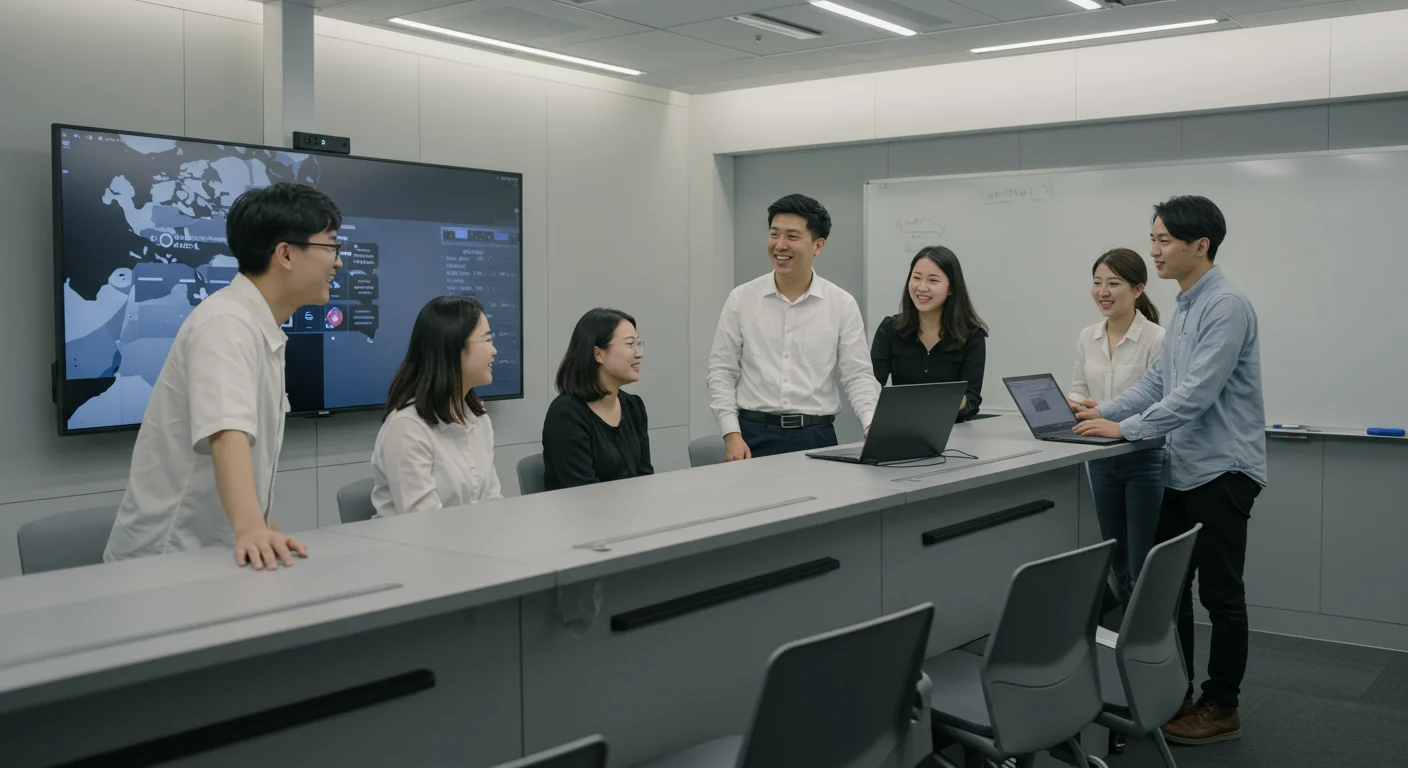
📋 Table of Contents
- 1.Why Choose an MBA in Korea?
- 2.Types of MBA Programs in Korea
- 3.Top Universities for MBA in Korea
- 4.Admission Requirements and Application Process
- 5.Tuition Fees and Scholarship Opportunities
- 6.Curriculum and Learning Experience
- 7.Career Prospects After Graduation
- 8.Support for International Students
Have you ever thought about taking your career to the next level? An MBA can be a fantastic way to do that, and getting an MBA in Korea might just be the perfect choice for you! 😊
South Korea offers a dynamic business environment and world-class education that can really help you grow as a global leader. I’m here to tell you all about why an MBA in Korea could be your next big adventure.
Why Choose an MBA in Korea?

Students collaborating in a modern university setting
South Korea has a reputation for having a world-renowned education system, and its MBA programs are no exception. They are designed to nurture future business leaders who can excel in our fast-changing world. Imagine learning in a place where innovation is always happening!
Many top universities like Seoul National University, Korea University, Yonsei University, and KAIST are globally recognized. They offer practical education, amazing global connections, and many chances to link up with different industries. It’s truly a great place to get an MBA in Korea. You can find more details about various programs at Standyou’s guide to MBA in South Korea.
Types of MBA Programs in Korea

A diverse group of MBA students discussing their program options
When you’re looking into an MBA in Korea, you’ll find lots of different programs to fit your needs. It’s like choosing your favorite flavor of ice cream!
Common MBA Program Types 📝
- Full-time MBA: This is usually a 1 to 2-year program where you study intensively. Seoul National University offers a 1-year (4-semester) full-time MBA, with classes in both English and Korean.
- Part-time MBA: Perfect if you want to keep working while studying. Ewha Womans University, for example, has a 2-year part-time MBA.
- Global MBA: These programs focus on international business and often have a diverse student body. Ewha Womans University also runs a 1.5-year (3-semester) Global MBA.
- Specialized MBA: Some universities offer unique programs, like Ewha Womans University’s Art & Luxury Business MBA, which focuses on specific industries.
Each type has its own advantages, so you can pick what’s best for your career goals and lifestyle!
Top Universities for MBA in Korea

An aerial view of a prestigious university campus in Seoul
When thinking about an MBA in Korea, you’ll definitely want to know which schools are leading the way. Many Korean universities boast excellent MBA programs.
Leading MBA Programs 📌
- Seoul National University (SNU): Offers a 1-year (4-semester) Full-time MBA with strong global networks, dual degree options, and exchange programs. Class starts around July-August, with about 100 students. You can explore their program overview here.
- Korea University: Has a large intake, with 200 domestic students and 40 international students. They admit once a year in spring and offer a separate Global MBA.
- Yonsei University: Their Global MBA is a 3-semester program starting in September 2025. It’s a selective program with about 50 students from diverse backgrounds.
- Ewha Womans University: Provides various tracks like Global MBA, Frontier MBA, and Art & Luxury MBA, each accommodating up to 100 students.
These universities are known for their quality education and helping students succeed in the business world.
Admission Requirements and Application Process
Applying for an MBA in Korea can seem a bit complex, but it’s pretty straightforward once you know the steps. Most universities have similar basic requirements.
Key Admission Requirements ✅
- Bachelor’s Degree: You usually need to have a bachelor’s degree or be expected to get one by August 2025.
- Work Experience: Some programs are specifically for working professionals.
- International Track: If you’re an international student, there are often special tracks for foreign nationals or those who completed their education overseas.
The application process typically involves a few steps:
- Fill out an online application.
- Submit required documents.
- Pay the application fee (around $80-100 USD).
- Attend an interview (in-person or online).
- Receive your final admission notice.
For instance, Yonsei University’s 2025 Global MBA applications open in March-April, with results in June and classes starting in September. Always check the specific university’s admission guidelines for exact dates and requirements.
Tuition Fees and Scholarship Opportunities

A student researching scholarship opportunities on a tablet
The cost of an MBA in Korea can vary a lot depending on the school and the program you choose. It’s important to plan your finances carefully.
Generally, the total tuition for a 1-to-2-year program is usually in the range of 30 million to 50 million KRW (approximately $22,000 to $37,000 USD). Keep in mind that there might be additional fees, like an application fee of $100 for Yonsei Global MBA, plus around $40 for bank transfer fees. For more general information on costs, you can check out Mastersportal’s guide.
Many universities offer scholarships to help students with their tuition. These can include:
- Admission Scholarships
- Merit-based Scholarships
- Global Scholarships (especially for international students)
Curriculum and Learning Experience
The curriculum for an MBA in Korea is designed to give you a strong foundation in business while also providing real-world experience. You’ll learn all the important stuff like finance, marketing, strategy, and HR.
Beyond the core subjects, programs often include practical projects, global case studies, and opportunities for exchange programs or dual degrees. For example, Seoul National University offers weekday morning and afternoon classes, while Yonsei University uses intensive winter/summer sessions. These programs often include exciting exchanges with top universities abroad, case studies, and field practice to give you a hands-on learning experience. You can find out more about what Korea University Business School offers here.
Career Prospects After Graduation
What happens after you earn your MBA in Korea? The good news is, graduates have a wide range of career options! Many go into fields like consulting, finance, strategic planning for large corporations, or even start their own businesses.
If you pursue a Global MBA, your English communication skills and international network will be a huge asset, helping you land jobs at multinational companies or expand your career globally. Employers often value the leadership and organizational management skills you gain during your MBA, which can help you climb the corporate ladder into management and executive roles. Learn more about career paths for an MBA in South Korea here.
An MBA can significantly enhance your leadership skills and strategic thinking, making you a strong candidate for advanced roles and global opportunities.
Support for International Students
If you’re an international student considering an MBA in Korea, don’t worry! Korean universities are well-equipped to support you. You’ll need to meet certain requirements for your D-2 student visa, like providing proof of bank balance (around 20 million KRW or $20,000 USD).
International Student Services 🌍
- English Tracks: Many programs offer courses taught entirely in English.
- Dedicated Support: Universities often have special offices just for international students to help with admissions and daily life.
- Accommodation: Dormitories and housing support services are usually available.
- Cultural Adaptation: Look out for orientation programs, Korean language classes, and cultural experience events to help you settle in.
These services make sure your journey to getting an MBA in Korea is as smooth and enjoyable as possible!
📚 Recommended Articles
Key Takeaways About MBA in Korea 📝
To quickly sum things up about getting an MBA in Korea, here are the most important points:
- Global Recognition: Korean MBA programs are highly regarded worldwide, focusing on innovative, practical education and leadership development.
- Diverse Programs: Options include Full-time, Part-time, Global, and Specialized MBAs to fit different career goals and lifestyles.
- Top Universities: Prestigious schools like Seoul National University, Korea University, Yonsei University, and Ewha Womans University offer excellent programs.
- Career Advancement: Graduates find opportunities in consulting, finance, large corporations, startups, and international companies, often leading to leadership roles.
- International Support: Universities provide extensive support for international students, including English tracks, dedicated offices, accommodation, and cultural programs.
Your MBA in Korea Journey
Frequently Asked Questions ❓
I hope this detailed guide helps you understand the exciting opportunities that an MBA in Korea can offer! With its top-tier education and vibrant business scene, it’s a fantastic place to build your future. If you have any more questions, feel free to ask in the comments below! 😊
